Health
New AI ultrasound tech is first to land FDA approval to enhance prenatal care: ‘Better health outcomes’
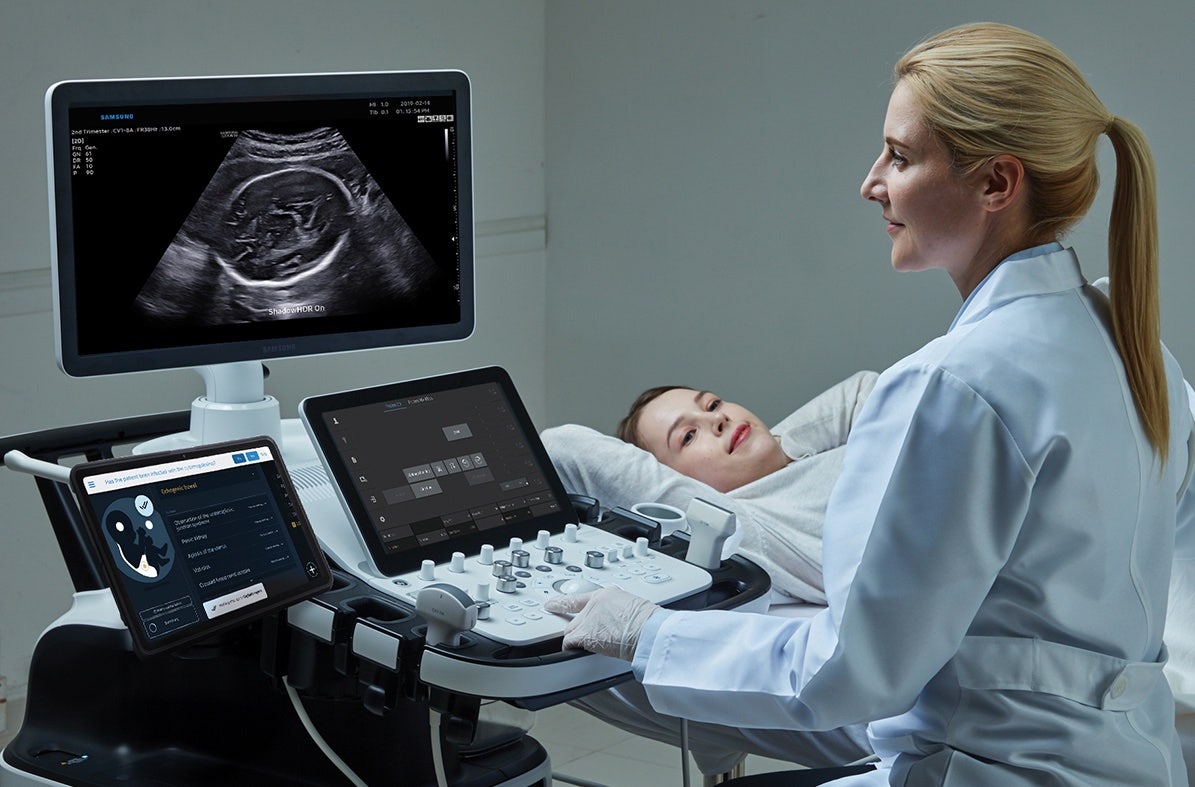
Artificial intelligence-powered ultrasounds are now one step closer to becoming part of routine prenatal care.
Sonio Detect, an AI-powered ultrasound scanning technology, has become the first product of its kind to land FDA approval.
Made by Sonio, a “femtech” company based in Paris, France, the AI product functions as a high-tech helper for maternity care professionals, scanning for warning signs that could indicate fetal health issues.
WHAT IS ARTIFICIAL INTELLIGENCE (AI)?
During testing, when Sonio Detect scanned over 70,000 ultrasound images, the technology identified more than 300 potential prenatal syndromes and anomalies with an accuracy rate of 95% or higher, the company said.
Sonio Detect is compatible with any type of ultrasound technology, including GE, Samsung and Caron, according to a press release announcing the FDA approval.
An AI-powered ultrasound scanning technology called Sonio Detect has become the first product of its kind to land FDA approval. (Sonio)
“Traditional fetal ultrasounds require manual labeling on every captured image,” Sonio’s CEO and co-founder Cecile Brosset said in an interview with Fox News Digital.
“This manual process is prone to errors and forgetting important images of the fetus — especially when a standard second-trimester exam includes more than 80 images.”
Studies show that ultrasound exams are often lower in quality or incomplete, leading to half of all fetal anomalies being missed before birth, Brosset said.
AI BABIES: NEW TECHNOLOGY IS HELPING FERTILITY DOCS CHOOSE THE BEST EMBRYOS FOR IVF
Birth defects affect one in every 33 babies born in the United States each year, according to the Centers for Disease Control and Prevention (CDC).
About half are not detected during ultrasounds.
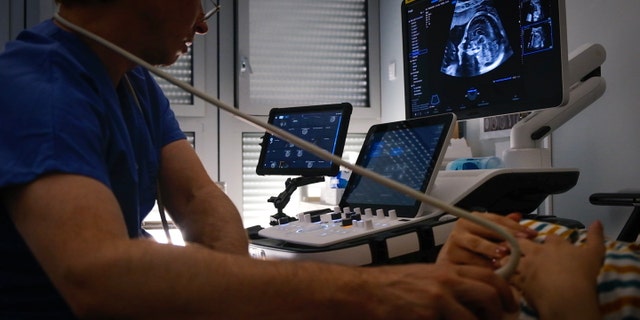
The AI product functions as a high-tech helper for maternity care professionals, scanning for warning signs that could indicate fetal health issues. (Sonio)
“Missing a fetal view or taking a low-quality image can lead to missed anomalies that could have been detected earlier,” Brosset said.
“This leads to a lack of proper care of pregnant women and fetuses when treatments could have drastically improved the pregnancy outcome.”
“Missing a fetal view or taking a low-quality image can lead to missed anomalies that could have been detected earlier.”
Sonio Detect helps health care professionals ensure that ultrasound exams are complete and that the images are of good quality. It also has the capability to automatically extract images from clips acquired by physicians.
For physicians, Brosset said, the AI-powered tool serves as a “safety net,” giving them peace of mind by verifying the quality and exhaustiveness of their exams.
PREGNANT WOMEN STRUGGLE TO FIND CARE IN ‘MATERNITY DESERTS,’ NEW STUDY FINDS: ‘WE NEED MORE SUPPORT’
“They are not bothered with manual labeling or checklists, which means they get to spend more time with the patient and on scanning rather than cumbersome manual tasks,” she said.
Sonio Detect is designed for use by all pregnant women, not just high-risk patients, Brosset noted.
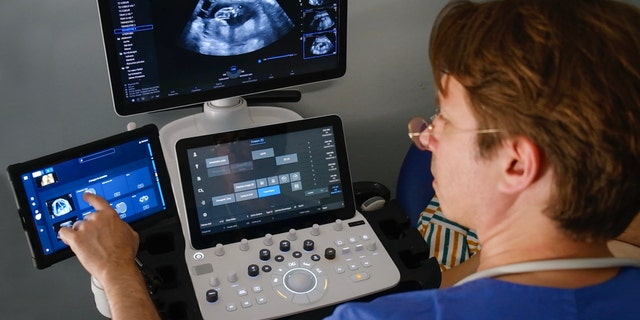
During testing, when Sonio Detect scanned over 70,000 ultrasound images, the technology identified more than 300 potential prenatal syndromes and anomalies with an accuracy rate of 95% or higher, the company said. (Sonio)
“The technology ensures that complete customizable protocols can be implemented regardless of patients’ BMI, age, ethnicity or gestational age,” she said.
“This broad applicability makes it a valuable and inclusive tool for monitoring and caring for” pregnant women all over the world, she also said.
Dr. Marie Ramas, family physician and regional medical director of Aledade Health in New Hampshire, said she can foresee the Sonio Direct tool being very helpful in underserved areas, such as rural or underinsured regions.
AI MAY HAVE AN ‘EYE’ ON GROWING BABIES: COULD PREDICT PREMATURE BIRTH AS EARLY AS 31 WEEKS
“Due to a current health care environment that looks more and more at population health and creates pathways that reinforce practices and procedures to normalize outcomes, I can see a place for AI to help move us into that direction,” she told Fox News Digital.
“The algorithms of AI could be useful in finding population health trends, especially in high-risk populations,” she went on.
“Obstetrical ultrasounds can identify known causes and diseases quickly and efficiently. This can free up a physician’s time to confirm a diagnosis and treatment.”
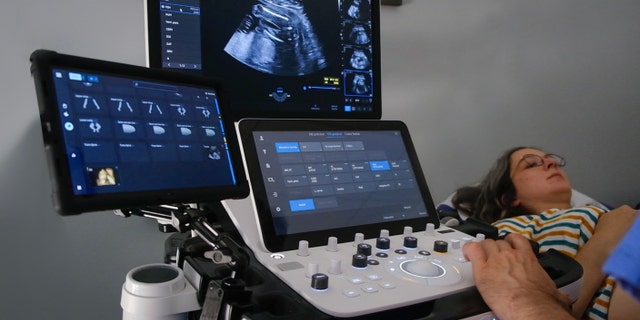
Sonio Detect is designed to assist the sonographer and ultrasound reader to make the best decision, but is not intended to replace their expertise. (Sonio)
Sonio Detect is designed to assist the sonographer and ultrasound reader to make the best decision — but is not intended to replace their expertise.
“Diagnostic tools should be used to support clinical suspicion,” said Ramas. “With the physician workforce declining and non-physician clinical care increasing, we have to be careful about using algorithms to guide treatment protocols outside of a family physician and care team.”
“The use of AI cannot replace the heart and human aspect of medicine.”
“The use of AI cannot replace the heart and human aspect of medicine,” she went on.
“The development of algorithms is still based on the perceived perspectives of the coders who create them, leading to potential blind spots in diagnoses.”
CLICK HERE TO SIGN UP FOR OUR HEALTH NEWSLETTER
Now that the company has received FDA approval, the goal is to make Sonio Detect available in the U.S. by early October.
It will be available initially to women’s health MSOs (management services organizations), private practices, community centers and academic centers.
The company is still investigating insurance coverage.
Said Brosset, “Our goal is to transform prenatal care by providing a reliable tool that ensures better health outcomes for both mothers and babies.”

Health
Jennifer Hudson Lost 80-Lbs Without Depriving Herself—Learn Her Secrets

Sign Up
Create a free account to access exclusive content, play games, solve puzzles, test your pop-culture knowledge and receive special offers.
Already have an account? Login
Use left and right arrow keys to navigate between menu items.
Use escape to exit the menu.
Health
Kennedy’s Plan for the Drug Crisis: A Network of ‘Healing Farms’

Though Mr. Kennedy’s embrace of recovery farms may be novel, the concept stretches back almost a century. In 1935, the government opened the United States Narcotic Farm in Lexington, Ky., to research and treat addiction. Over the years, residents included Chet Baker and William S. Burroughs (who portrayed the institution in his novel, “Junkie: Confessions of an Unredeemed Drug Addict”). The program had high relapse rates and was tainted by drug experiments on human subjects. By 1975, as local treatment centers began to proliferate around the country, the program closed.
In America, therapeutic communities for addiction treatment became popular in the 1960s and ’70s. Some, like Synanon, became notorious for cultlike, abusive environments. There are now perhaps 3,000 worldwide, researchers estimate, including one that Mr. Kennedy has also praised — San Patrignano, an Italian program whose centerpiece is a highly regarded bakery, staffed by residents.
“If we do go down the road of large government-funded therapeutic communities, I’d want to see some oversight to ensure they live up to modern standards,” said Dr. Sabet, who is now president of the Foundation for Drug Policy Solutions. “We should get rid of the false dichotomy, too, between these approaches and medications, since we know they can work together for some people.”
Should Mr. Kennedy be confirmed, his authority to establish healing farms would be uncertain. Building federal treatment farms in “depressed rural areas,” as he said in his documentary, presumably on public land, would hit political and legal roadblocks. Fully legalizing and taxing cannabis to pay for the farms would require congressional action.
In the concluding moments of the documentary, Mr. Kennedy invoked Carl Jung, the Swiss psychiatrist whose views on spirituality influenced Alcoholics Anonymous. Dr. Jung, he said, felt that “people who believed in God got better faster and that their recovery was more durable and enduring than people who didn’t.”
Health
Children exposed to higher fluoride levels found to have lower IQs, study reveals

The debate about the benefits and risks of fluoride is ongoing, as RFK Jr. — incoming President Trump’s pick for HHS secretary — pushes to remove it from the U.S. water supply.
“Fluoride is an industrial waste associated with arthritis, bone fractures, bone cancer, IQ loss, neurodevelopmental disorders and thyroid disease,” RFK wrote in a post on X in November.
A new study published in JAMA Pediatrics on Jan. 6 found another correlation between fluoride exposure and children’s IQs.
RFK JR. CALLS FOR REMOVAL OF FLUORIDE FROM DRINKING WATER, SPARKING DEBATE
Study co-author Kyla Taylor, PhD, who is based in North Carolina, noted that fluoridated water has been used “for decades” to reduce dental cavities and improve oral health.
Fluoride exposure has been linked to a variety of negative health effects, yet benefits oral health. (iStock)
“However, there is concern that pregnant women and children are getting fluoride from many sources, including drinking water, water-added foods and beverages, teas, toothpaste, floss and mouthwash, and that their total fluoride exposure is too high and may affect fetal, infant and child neurodevelopment,” she told Fox News Digital.
The new research, led by scientists at the National Institute of Environmental Health Sciences (NIEHS), analyzed 74 epidemiological studies on children’s IQ and fluoride exposure.
FEDERAL JUDGE ORDERS EPA FURTHER REGULATE FLUORIDE IN DRINKING WATER DUE TO CONCERNS OVER LOWERED IQ IN KIDS
The studies measured fluoride in drinking water and urine across 10 countries, including Canada, China, Denmark, India, Iran, Mexico, Pakistan, New Zealand, Spain and Taiwan. (None were conducted in the U.S.)
The meta-analysis found a “statistically significant association” between higher fluoride exposure and lower children’s IQ scores, according to Taylor.
“[It showed] that the more fluoride a child is exposed to, the more likely that child’s IQ will be lower than if they were not exposed,” she said.
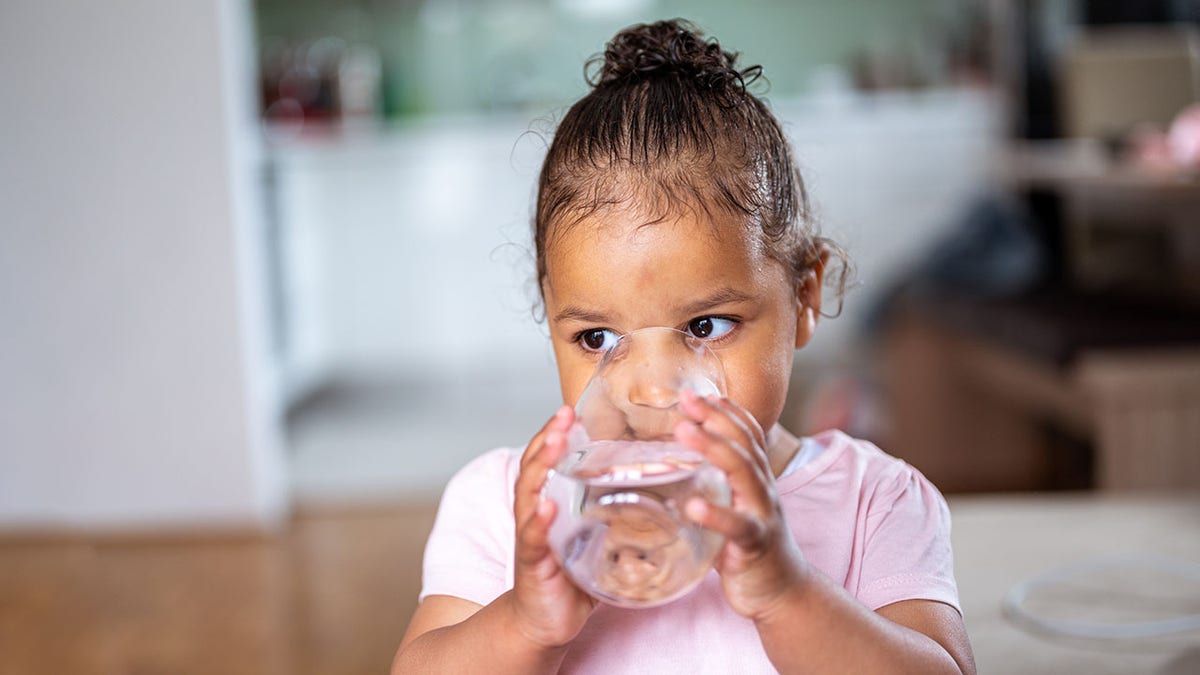
Scientists found a “statistically significant association” between higher fluoride exposure and lower children’s IQ scores. (iStock)
These results were consistent with six previous meta-analyses, all of which reported the same “statistically significant inverse associations” between fluoride exposure and children’s IQs, Taylor emphasized.
The research found that for every 1mg/L increase in urinary fluoride, there was a 1.63-point decrease in IQ.
‘Safe’ exposure levels
The World Health Organization (WHO) has established 1.5mg/L as the “upper safe limit” of fluoride in drinking water.
“There is concern that pregnant women and children are getting fluoride from many sources.”
Meanwhile, the U.S. Public Health Service recommends a fluoride concentration of 0.7 mg/L in drinking water.
“There was not enough data to determine if 0.7 mg/L of fluoride exposure in drinking water affected children’s IQs,” Taylor noted.
FDA BANS RED FOOD DYE DUE TO POTENTIAL CANCER RISK
Higher levels of the chemical can be found in wells and community water serving nearly three million people in the U.S., the researcher noted.
She encouraged pregnant women and parents of small children to be mindful of their total fluoride intake.

Nearly three million people have access to wells and community water with fluoride levels above the levels suggested by the World Health Organization. (iStock)
“If their water is fluoridated, they may wish to replace tap water with low-fluoride bottled water, like purified water, and limit exposure from other sources, such as dental products or black tea,” she said.
“Parents can use low-fluoride bottled water to mix with powdered infant formula and limit use of fluoridated toothpaste by young children.”
For more Health articles, visit www.foxnews.com/health.
While the research did not intend to address broader public health implications of water fluoridation in the U.S., Taylor suggested that the findings could help inform future research into the impact of fluoride on children’s health.
Dental health expert shares cautions
In response to this study and other previous research, Dr. Ellie Phillips, DDS, an oral health educator based in Austin, Texas, told Fox News Digital that she does not support water fluoridation.

The study researcher encouraged parents of small children to be mindful of their total fluoride intake. (iStock)
“I join those who vehemently oppose public water fluoridation, and I question why our water supplies are still fluoridated in the 21st century,” she wrote in an email.
“There are non-fluoridated cities and countries where the public enjoy high levels of oral health, which in some cases appear better than those that are fluoridated.”
CLICK HERE TO SIGN UP FOR OUR HEALTH NEWSLETTER
Phillips called the fluoride debate “confusing” even among dentists, as the American Dental Association (ADA) advocates for fluoride use for cavity prevention through water fluoridation, toothpaste and mouthwash — “sometimes in high concentrations.”

Fluoride is used in water, toothpaste and mouthwash to help prevent cavities. (iStock)
“[But] biologic (holistic) dentists generally encourage their patients to fear fluoride and avoid its use entirely, even if their teeth are ravaged by tooth decay,” she said.
“Topical fluoride is beneficial, while systemic consumption poses risks.”
Phillips encouraged the public to consider varying fluoride compounds, the effect of different concentrations and the “extreme difference” between applying fluoride topically and ingesting it.
“Topical fluoride is beneficial, while systemic consumption poses risks,” she cautioned.
“Individuals must take charge of their own oral health using natural and informed strategies.”
The study received funding from the National Institute of Environmental Health Sciences (NIEHS), the National Institutes of Health (NIH) and the Intramural Research Program.
-
/cdn.vox-cdn.com/uploads/chorus_asset/file/25822586/STK169_ZUCKERBERG_MAGA_STKS491_CVIRGINIA_A.jpg)
/cdn.vox-cdn.com/uploads/chorus_asset/file/25822586/STK169_ZUCKERBERG_MAGA_STKS491_CVIRGINIA_A.jpg) Technology1 week ago
Technology1 week agoMeta is highlighting a splintering global approach to online speech
-

 Science1 week ago
Science1 week agoMetro will offer free rides in L.A. through Sunday due to fires
-
/cdn.vox-cdn.com/uploads/chorus_asset/file/23935558/acastro_STK103__01.jpg)
/cdn.vox-cdn.com/uploads/chorus_asset/file/23935558/acastro_STK103__01.jpg) Technology7 days ago
Technology7 days agoAmazon Prime will shut down its clothing try-on program
-

 News1 week ago
News1 week agoMapping the Damage From the Palisades Fire
-
/cdn.vox-cdn.com/uploads/chorus_asset/file/25826211/lorealcellbioprint.jpg)
/cdn.vox-cdn.com/uploads/chorus_asset/file/25826211/lorealcellbioprint.jpg) Technology6 days ago
Technology6 days agoL’Oréal’s new skincare gadget told me I should try retinol
-
/cdn.vox-cdn.com/uploads/chorus_asset/file/25832751/2192581677.jpg)
/cdn.vox-cdn.com/uploads/chorus_asset/file/25832751/2192581677.jpg) Technology3 days ago
Technology3 days agoSuper Bowl LIX will stream for free on Tubi
-

 Business4 days ago
Business4 days agoWhy TikTok Users Are Downloading ‘Red Note,’ the Chinese App
-
/cdn.vox-cdn.com/uploads/chorus_asset/file/25835602/Switch_DonkeyKongCountryReturnsHD_scrn_19.png)
/cdn.vox-cdn.com/uploads/chorus_asset/file/25835602/Switch_DonkeyKongCountryReturnsHD_scrn_19.png) Technology1 day ago
Technology1 day agoNintendo omits original Donkey Kong Country Returns team from the remaster’s credits















